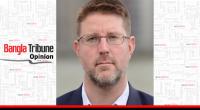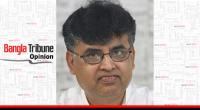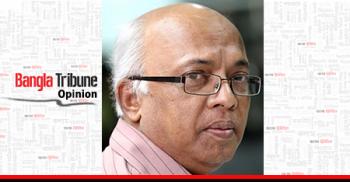 It is time to remember a giant in Bengali politics.
It is time to remember a giant in Bengali politics.
Forty-three years ago, on 17 November 1976, Moulana Abdul Hamid Khan Bhashani died. A whole era went with him.
Maulana Bhashani occupies a significant perch in Bangladesh’s history. He was a maverick in more than one sense of the meaning. And yet he was a maverick who somehow identified with us despite the often shifting sands of his politics. His entry into the history books was guaranteed when he decided to defy the regime of Field Marshal Mohammad Ayub Khan in the turbulent days of the Mass Upsurge of 1969 when he took upon himself the definitive role of upping the pressure on the dictator to quit office.
As students all over the country, together with the broad citizenry, took to the streets to demand a withdrawal of the Agartala Conspiracy Case and indeed a return to democracy, it was Bhashani who swiftly turned into a necessary catalytic force that would carry the movement forward. It was on his watch that the Bengalis of East Pakistan heightened their call for the release of Sheikh Mujibur Rahman and all his co-accused from incarceration as a first step toward ensuring an Ayub-free Pakistan.
It was again Bhashani who ensured that the incarcerated Mujib (not yet Bangabandhu) did not succumb to the temptation of joining, on parole, the round table conference Ayub Khan had called in Rawalpindi as a way of tiding over the crisis threatening to topple his regime. Bhashani’s argument was without ambiguity: Mujib would have to be freed, without conditions, before peace could return to the country. Sometime in the third week of February 1969, he warned the regime that he would lead a march on the Dhaka cantonment to free Mujib and his co-accused if the Agartala case were not withdrawn. On February 22, the regime caved in. By the end of March, it had passed into history.
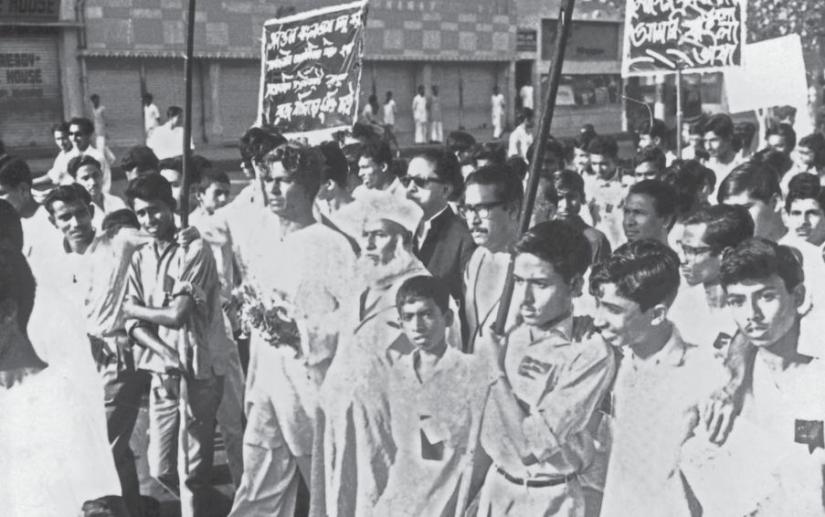 In Maulana Bhashani burned a light ever ready to speak up for the masses, those who lived on the fringes of society. In the 1950s and 1960s, Pakistan’s Bengalis formed the core of that group of have-nots, people who needed to have their identity firmly etched on the consciousness of the country as a whole. And Bhashani, since his foray into the realm of politics in the 1920s, had made it a point to embarrass the powerful and the arrogant and the self-indulgent with his clear determination to be a voice for the deprived and the disenfranchised. His advocacy of Pakistan in the 1940s was rooted in his conviction that it would afford Bengali Muslims an opportunity to expand their horizons in a refreshing spirit of freedom.
In Maulana Bhashani burned a light ever ready to speak up for the masses, those who lived on the fringes of society. In the 1950s and 1960s, Pakistan’s Bengalis formed the core of that group of have-nots, people who needed to have their identity firmly etched on the consciousness of the country as a whole. And Bhashani, since his foray into the realm of politics in the 1920s, had made it a point to embarrass the powerful and the arrogant and the self-indulgent with his clear determination to be a voice for the deprived and the disenfranchised. His advocacy of Pakistan in the 1940s was rooted in his conviction that it would afford Bengali Muslims an opportunity to expand their horizons in a refreshing spirit of freedom.
But it was a dream that soon began to lose lustre, owing largely to the growing hubris of the ruling Muslim League post-1947. The party had become a stranger to him. He joined the political classes that would forge Pakistan’s first political opposition, the Awami Muslim League. That was in June 1949 and Bhashani took charge as the first president of the party. A few years down the line, Bhashani and his friends --- and they included Huseyn Shaheed Suhrawardy and a young, a rising star named Sheikh Mujibur Rahman --- decided that politics in Pakistan needed to be reinvented. And the first step was for the Awami Muslim League to open its doors to all citizens of Pakistan irrespective of faith, caste, colour and creed. The Awami Muslim League graduated to the Awami League. Secularism was to be its core principle.
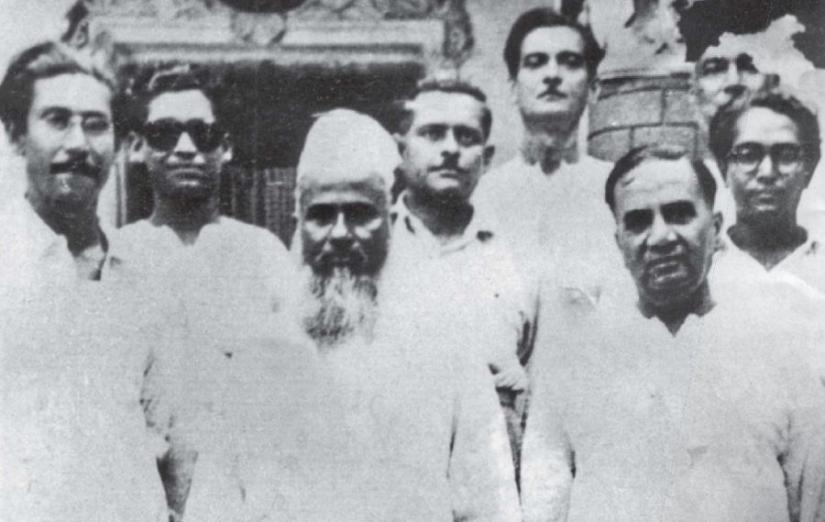 There was always a pronounced degree of energetic restlessness in Maulana Bhashani. Complacency was anathema to him; a high office he did not covet. It was always the grassroots he identified with. When he thought that Huseyn Shaheed Suhrawardy was pushing the Awami League into a clear pro-American camp in the later 1950s, he knew what he would do. At Kagmari in February 1957, he bade farewell to the Awami League and gathered his followers into a new organization he called the National Awami Party.
There was always a pronounced degree of energetic restlessness in Maulana Bhashani. Complacency was anathema to him; a high office he did not covet. It was always the grassroots he identified with. When he thought that Huseyn Shaheed Suhrawardy was pushing the Awami League into a clear pro-American camp in the later 1950s, he knew what he would do. At Kagmari in February 1957, he bade farewell to the Awami League and gathered his followers into a new organization he called the National Awami Party.
At Kagmari he did something else: he warned the state of Pakistan that unless it began to fulfil the aspirations of all its people, it would find Bengalis waving it off with an assalam o alaikum. That was a bold act. It was the first sign of what could happen in the country if the state of Pakistan continued to ignore its Bengalis. Bhashani’s audacity, for that, was the way the powerful men in distant Karachi looked at it, would not go down well with the powers that were. General Iskandar Mirza darkly, and indecently, warned that Bhashani would be shot like a dog. The irony, in hindsight, is not to be missed: it was Mirza who would pass into oblivion; Bhashani lived on, to wage many more wars on the harsh battlefields of politics.
Political determination apart, there was too an eccentric side to the Bhashani character. He refused, along with Zulfikar Ali Bhutto, to be part of the round table conference in Rawalpindi in February-March 1969. And yet in 1963, the Left-leaning Maulana Bhashani had proffered the gratuitous advice that Ayub Khan should not be disturbed, probably out of his belief that the dictator was then busy redefining Pakistan’s foreign policy in terms of relations with China. The eccentricity went further: in December 1970, only days before the general elections, he announced his party’s withdrawal from the vote. On a more intriguing note, he announced the ‘independence’ of East Pakistan from the rest of Pakistan. His fondness for Bangabandhu Sheikh Mujibur Rahman fell into the paternal mould, though he would remind Bengalis at nearly every public rally of his that Mujib had been one of the secretaries who had worked under him in the Awami League.
Like so many others, Bhashani was vocal against the imposition of Baksal in January 1975. And yet that did not stop him from going out of his way to welcome Bangabandhu to Santosh in March of that year. His weekly newspaper Haq Katha, in the early 1970s, became a conduit for the expression of vociferous dissent. He spared no one. When the violent coup of August 1975 toppled the government of Bangabandhu Sheikh Mujibur Rahman and left him and his family murdered, Bhashani, to our horror, did not condemn the crime.
And yet there are those who would have us know that when Khondokar Moshtaque Ahmed went to see him sometime after 15 August 1975, Bhashani had a simple question for the usurper: why had he taught the tiger to taste blood? The meaning was not lost on anyone. The Maulana knew what damage the Pakistan army had caused by commandeering politics in 1958.
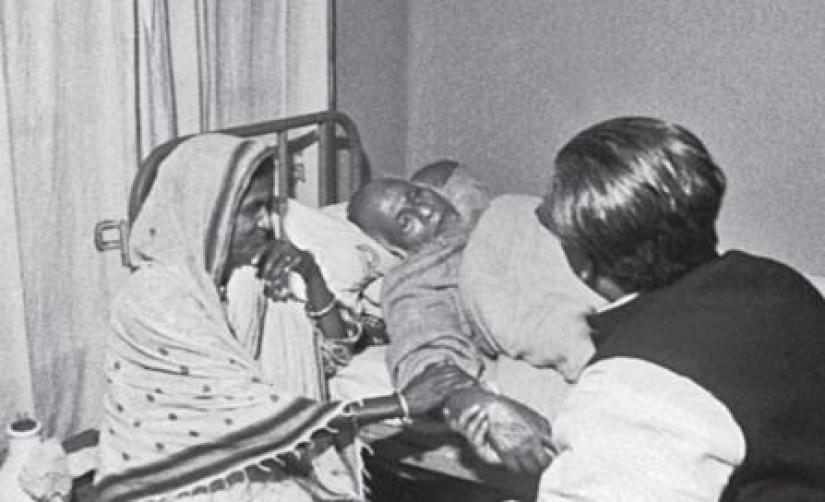 Maulana Bhashani’s place in Bangladesh’s history remains an enduring one because of his refusal to compromise with the status quo, before as well as after 1971. He had no wish to go to power, did not seek power and yet wielded authority through his moral presence on the political stage. His politics was not perfect and yet it was geared to the attainment of the public weal. His contradictions were glaring.
Maulana Bhashani’s place in Bangladesh’s history remains an enduring one because of his refusal to compromise with the status quo, before as well as after 1971. He had no wish to go to power, did not seek power and yet wielded authority through his moral presence on the political stage. His politics was not perfect and yet it was geared to the attainment of the public weal. His contradictions were glaring.
He was the Red Maulana who, by the mid-1970s, would sound the disturbing trumpet for a Muslim Bangla. He was a secular man who towards the end of his life easily slipped into a communal mould, who could not dissuade his followers from taking him to be a holy man. He would listen to others in patience. And yet when the crowds around him became noisy, he would roar: Khamosh!
Not a leaf stirred, not a voice spoke. The moment was always Maulana Bhashani’s. The contradictions in his politics were part of his character.
(Maulana Abdul Hamid Khan Bhashani died on 17 November 1976).
Syed Badrul Ahsan is the author of biographies of Bangabandhu Sheikh Mujibur Rahman and Tajuddin Ahmad and writes on politics and diplomacy.

